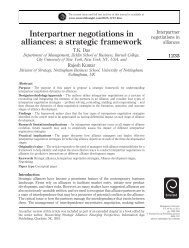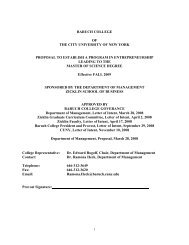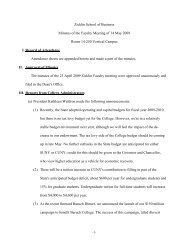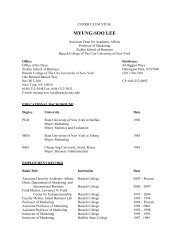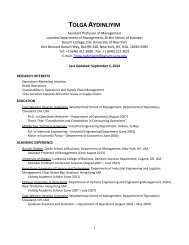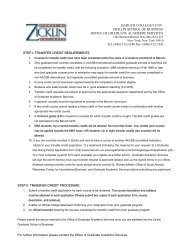Tax Seminar #3 – December 3 2012
Workbook - Zicklin School of Business
Workbook - Zicklin School of Business
You also want an ePaper? Increase the reach of your titles
YUMPU automatically turns print PDFs into web optimized ePapers that Google loves.
Dealing with the IRS Regarding<br />
Collections, Penalty Abatements<br />
and Examinations<br />
In practicing before the IRS regarding collection matters,<br />
Ipenalty abatements and examinations, I have found certain rules<br />
Iof engagement helpful. This is the sixth and final in the series of<br />
Iarticles in this magazine on such rules of engagement.<br />
14. Be Realistic With Your Client.<br />
Promise only what you know you can deliver, which will<br />
frequently result in your delivering more than anticipated.<br />
Throughout our communications with our client, we<br />
promise only what we know we can accomplish. Our goal is<br />
to establish trust with our clients and referral sources, while<br />
establishing reasonable expectations in the minds of our clients.<br />
Since much of our success depends upon our advocacy skills in<br />
working with a variety of individual decision-makers at the IRS,<br />
we are often able to deliver more than our clients anticipate.<br />
15. Confirm all Oral Agreements with the IRS field employees in writing<br />
and request that they sign off.<br />
In collection matters, the IRS often wants information more<br />
quickly than you can provide it with reasonable accuracy.<br />
Accordingly, you often enter into a negotiation with the Revenue<br />
Officer (RO) and establish mutually-agreeable deadlines. For<br />
example, when will back tax returns be filed? When will the form<br />
433-A be completed? How will interim payments, estimated<br />
taxes, and payroll tax deposits be handled? ROs are instructed<br />
to secure form 433-A information (client financial information)<br />
immediately. The assets/liabilities sections of the form 433-A<br />
are often straight-forward and can be completed in a relatively<br />
short timeframe. However, the budget section may take more<br />
time and finesse to present a complete and accurate picture of<br />
the taxpayer’s finances and monthly budget. Accordingly, you<br />
may agree on varying timelines for portions of the form 433-<br />
A in order to satisfy the RO’s need for securing at least some<br />
information quickly. In exchange for meeting the agreed-to<br />
timelines, you should negotiate with the RO to hold off in taking<br />
any collection actions and/or issuing notices that will accelerate<br />
the collection process.<br />
To avoid any possible misunderstandings, you should set<br />
forth the understandings with the RO in writing. You could do<br />
a memorandum to your client’s file. However, if you are dealing<br />
with a RO in the field, why not turn that memorandum into a<br />
letter and ask the RO to sign off on its contents? The worst that<br />
could happen is that the RO will not sign the letter. If the RO<br />
receives the letter and fails to object to its contents, I believe<br />
that such inaction would be considered a tacit agreement to the<br />
letter’s terms. If I am dealing with a RO whom I trust, I often<br />
6 I AUGUST/SEPTEMBER 2011 www.cpamagazine.com<br />
153<br />
In exchange for meeting<br />
"<br />
the agreed-to timelines, you<br />
should negotiate with the RO<br />
to hold off in taking any<br />
collection actions. "<br />
IRS<br />
REPRESENTATION<br />
E. Martin Davidoff, CPA, Esq.<br />
send the confirming letter and ask the RO to call me if any of<br />
the contents are inaccurate. If I do not trust the RO or have no<br />
long-term relationship with the RO, I will often insist that the<br />
RO sign off on the letter or issue their own letter of confirmation<br />
back to me. On occasion, I will go to the manager to secure a<br />
written confirmation from the RO.<br />
In drafting the letter, I take great care to write the<br />
agreement precisely as discussed. I would not want to be accused<br />
of attempting to renegotiate the agreement by using wording<br />
more favorable to my client than our discussion had provided.<br />
Sometimes, in drafting the letter, I will think of something<br />
that had not been discussed that should be included in our<br />
agreement. In such circumstances, I make it very clear that we<br />
had not discussed that aspect and invite the RO to call me if he/<br />
she does not agree with my proposed resolution of the issue.<br />
When dealing with IRS collections through the centralized<br />
telephone sites, securing written confirmation of oral agreements<br />
is nearly impossible. In such cases, I write detailed internal<br />
memoranda. If nothing else, each memorandum should clearly<br />
communicate to your client what has transpired. In lieu of a<br />
memorandum, I will often send a letter to my client summarizing<br />
the case’s status. Both the memorandum and the client letter<br />
serve the purpose of documenting what has transpired and<br />
communicating the status of the matter to your client.<br />
16. When you win, say “thank you” and “good-bye.”<br />
■ The Appeals Officer agrees to waive your client’s penalty;<br />
■ The Criminal Investigation Division decides not to<br />
prosecute your client;<br />
■ The IRS telephone assister agrees to accept a favorable<br />
installment agreement; or<br />
■ The IRS finally agrees to that Offer in Compromise.



